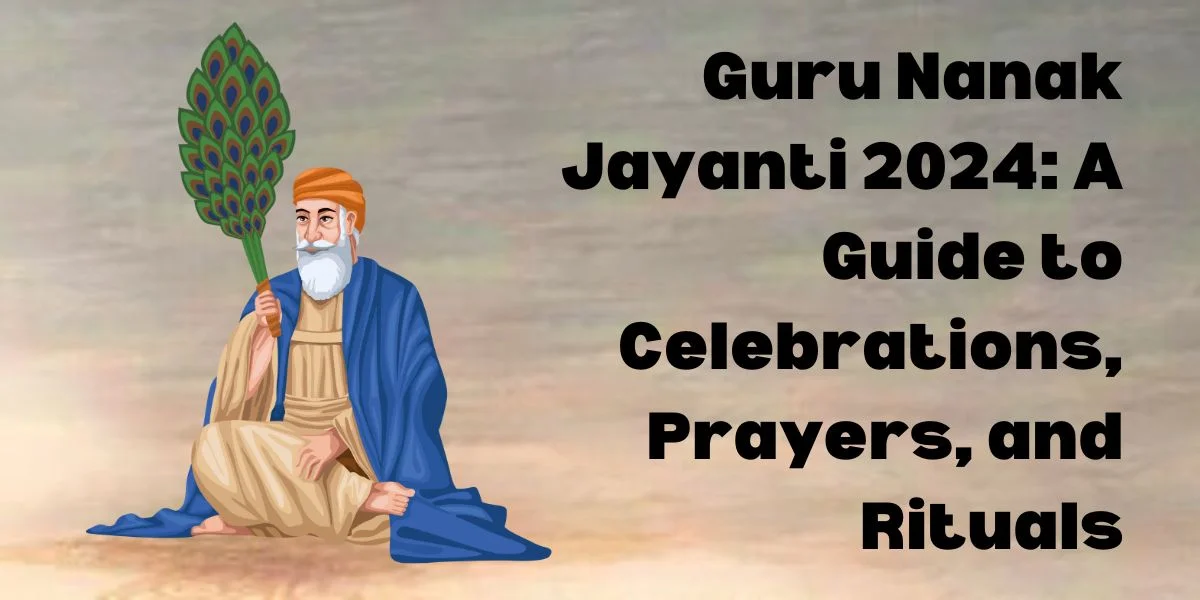Guru Nanak Jayanti 2024: A Guide to Celebrations, Prayers, and Rituals
Guru Nanak Jayanti, also known as Gurpurab, celebrates the birth anniversary of Guru Nanak Dev Ji, the revered founder of Sikhism. This festival is a deeply spiritual occasion celebrated by Sikhs and devotees around the world. In 2024, Guru Nanak Jayanti will be observed on Friday, November 15th, with devotees gathering to honor his teachings of compassion, humility, and devotion to God.
Who Was Guru Nanak?
Guru Nanak Dev Ji was born in 1469 in the village of Talwandi, which is now known as Nankana Sahib in modern-day Pakistan. He grew up questioning the societal and religious norms of his time, promoting instead a way of life focused on equality, compassion, and devotion to God. Through his teachings, he inspired a spiritual movement that ultimately laid the foundation for Sikhism, a monotheistic faith centered on the principles of oneness, selfless service, and equality. Guru Nanak’s philosophy continues to influence millions, emphasizing that God resides within everyone, and humanity should treat all with respect and kindness.
The Spiritual Importance of Guru Nanak Jayanti
Guru Nanak Jayanti, or Prakash Utsav, celebrates the enlightening wisdom that Guru Nanak brought to the world. This day reminds followers of his core teachings, encapsulated in the Mool Mantra, or the “Basic Mantra,” which translates as “There is one God, who is eternal, all-pervading, and self-existent.” On this day, Sikhs renew their dedication to his teachings, striving to embody values of integrity, humility, and service to humanity.
Also Read: https://ptrahulshastri.com/akshaya-navami-2024-benefits-why-its-celebrated/
Traditional Celebrations of Guru Nanak Jayanti
Guru Nanak Jayanti is celebrated with both grand processions and intimate prayer gatherings, making it a beautiful blend of public festivities and private reflection. Here’s how the celebrations typically unfold:
- Akhand Path: The festivities often begin with an “Akhand Path,” a continuous 48-hour recitation of the Guru Granth Sahib, the central scripture of Sikhism. This reading is conducted in Gurdwaras, where devotees take turns reciting without interruption, highlighting the communal dedication and reverence toward Guru Nanak’s teachings.
- Nagarkirtan: On the eve of Guru Nanak Jayanti, Sikhs join in a “Nagarkirtan,” a grand procession led by the “Panj Pyare,” or the Five Beloved Ones. During the procession, devotees sing hymns and chant verses from the Guru Granth Sahib. The Nagarkirtan is a joyful public celebration that often includes music, martial arts displays, and decorated floats depicting aspects of Guru Nanak’s life and teachings.
- Gurdwara Services: On the day of Guru Nanak Jayanti, devotees gather at local Gurdwaras to participate in prayer services, known as “Gurbani Kirtan.” During the prayer service, devotional Sikh hymns are sung, and sacred verses from the Guru Granth Sahib are recited. This gathering fosters a spirit of unity, humility, and collective worship.
- Karah Prasad and Langar: Following the service, a communal meal called “Langar” is served to all attendees. Langar, a tradition established by Guru Nanak himself, is a free meal prepared and served by volunteers. This meal is open to everyone, regardless of background, symbolizing equality and selfless service. “Karah Prasad,” a sweet offering, is also distributed as a blessed food symbolizing the sweet fruits of devotion.
- Sewa (Service): Sewa, or selfless service, is an integral part of the celebrations. Volunteers engage in various activities, from preparing Langar to cleaning Gurdwaras, demonstrating Guru Nanak’s principle of service to humanity.
Observing Guru Nanak Jayanti at Home
For those unable to visit a Gurdwara, Guru Nanak Jayanti can be celebrated at home. Here are ways to observe the day meaningfully:
- Home Prayers and Hymns: Devotees can start the day with a prayer or by reading passages from the Guru Granth Sahib. Sikh hymns, or “Shabads,” dedicated to Guru Nanak can also be played, filling the home with a spiritual atmosphere.
- Meditation and Reflection: Take some time to meditate on Guru Nanak’s teachings, reflecting on his principles of humility, kindness, and oneness. Reading a few lines from the Mool Mantra can serve as a grounding reminder of his message.
- Offering Sewa in the Community: Engaging in acts of service, such as donating to charities or helping those in need, aligns with the spirit of Guru Nanak’s teachings. Volunteering at community centers or distributing food to the less fortunate can be a way to honor his legacy.
Prayers and Rituals on Guru Nanak Jayanti
Prayer holds a special place in Guru Nanak Jayanti celebrations, and Sikhs use this day to seek guidance, inner peace, and closeness to the Divine. Here are some key rituals and prayers observed on this day:
- Japji Sahib Path: Reciting the Japji Sahib, a composition by Guru Nanak Dev Ji, is one of the most revered prayers. It reflects Guru Nanak’s philosophy and offers guidance on living a life filled with devotion and truth.
- Sukhmani Sahib Path: Some devotees also recite the Sukhmani Sahib, a prayer composed by Guru Arjan Dev Ji, which invokes peace and mental clarity.
- Singing Kirtan: During Guru Nanak Jayanti, Sikh families sing or play kirtans – devotional songs that express devotion to Guru Nanak. This form of worship encourages a deep connection with the Guru’s teachings, emphasizing a pure, joyful heart.
How Guru Nanak Jayanti is Celebrated Globally
Guru Nanak Jayanti has a vast global presence, especially in countries with sizable Sikh communities, including India, the UK, Canada, and the United States. Celebrations abroad often include “open house” Gurdwara events that welcome people of all faiths to participate in the festivities, learn about Sikhism, and enjoy a meal together. Many Sikh organizations also use this occasion to engage in community service initiatives, strengthening bonds across communities.
Key Takeaways of Guru Nanak Jayanti
Guru Nanak Jayanti is not only a day of celebration but also a reminder to embody Guru Nanak’s teachings in our daily lives. His message of treating all with respect, living truthfully, and serving selflessly resonates universally. For Sikhs, this day strengthens faith and commitment to the Guru’s path, while for others, it serves as an invitation to learn from his timeless wisdom.

